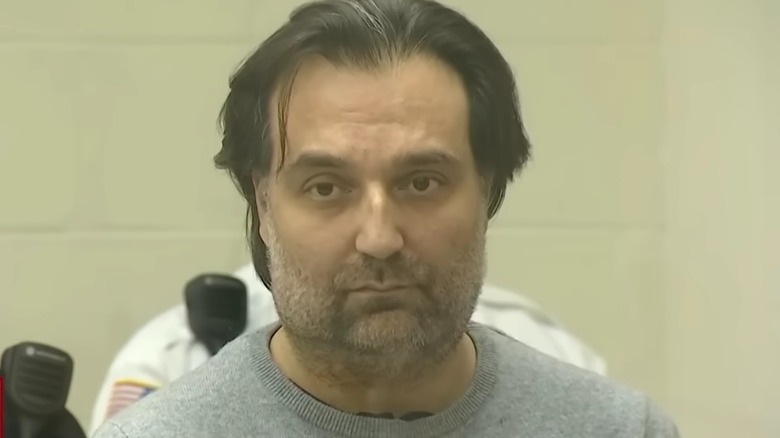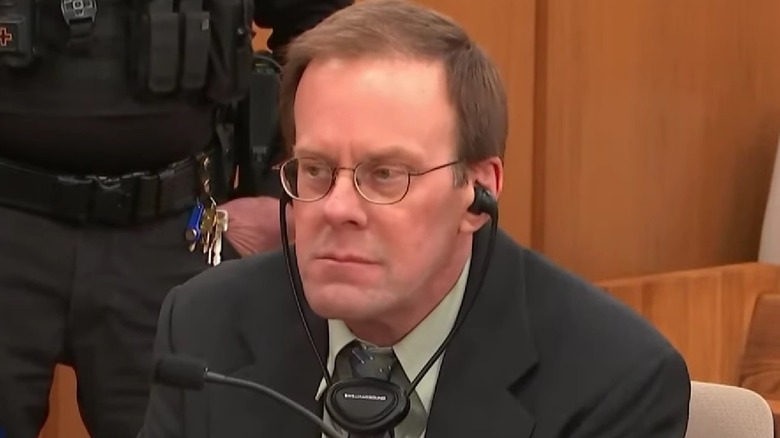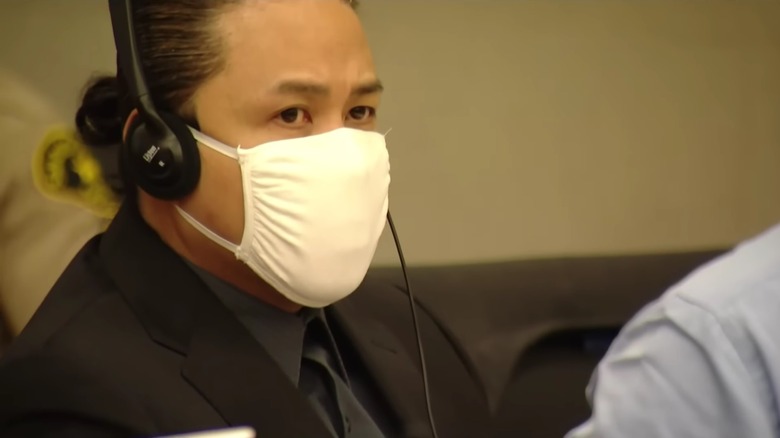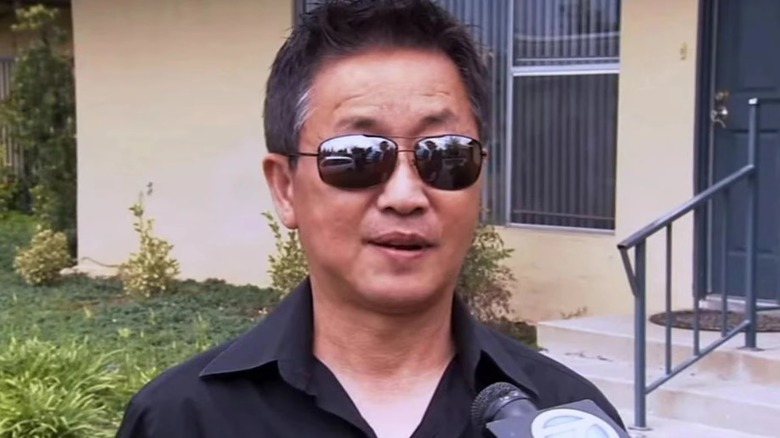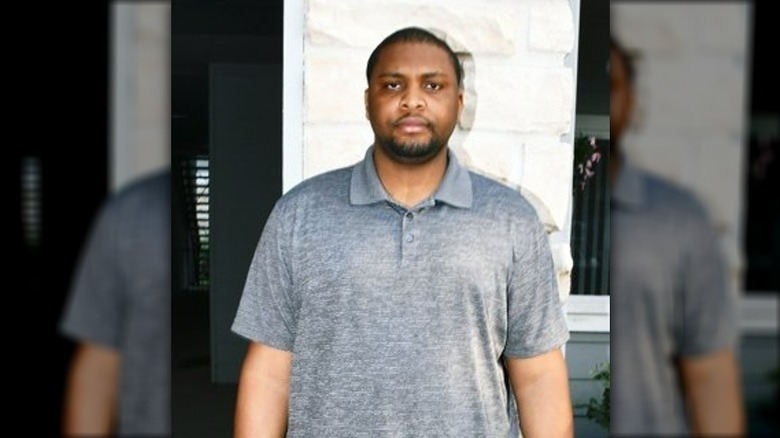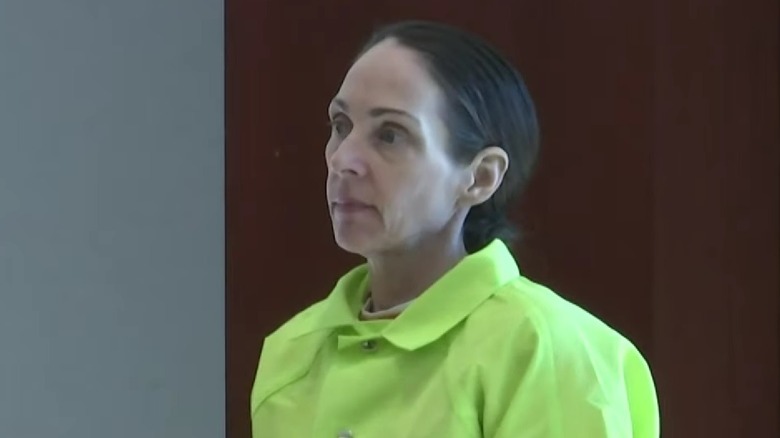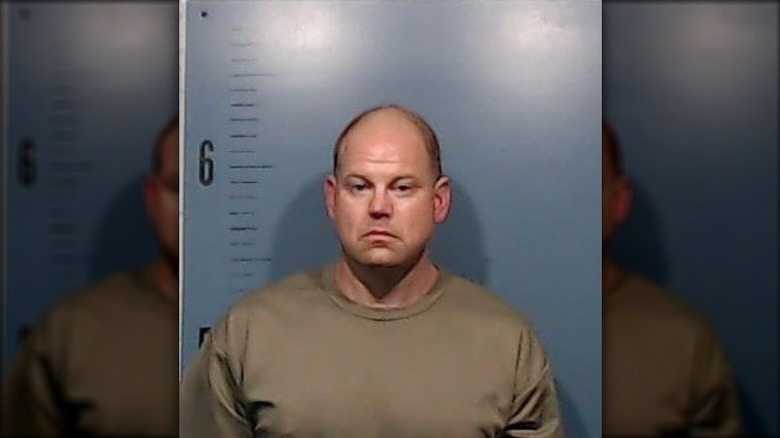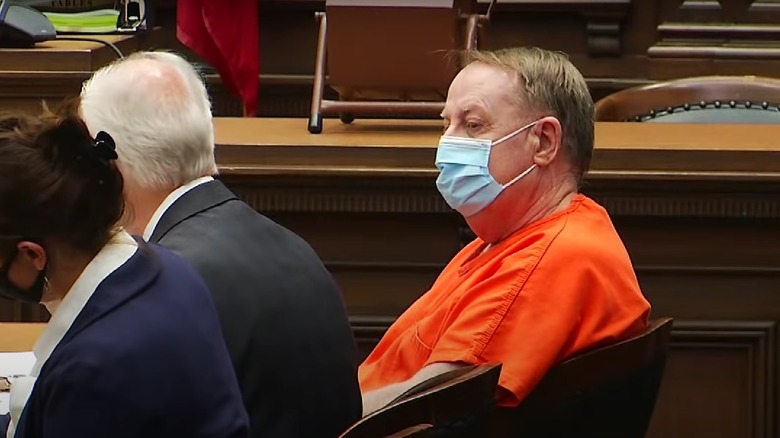The Most Disturbing Online Searches Of Suspected Killers
If true-crime shows have taught us anything, it's that it is virtually impossible to get away with murder. Even without taking into account the impressive advances in DNA technology and the proliferation of cameras everywhere within the last couple of decades, there are just too many ways to leave behind the crucial evidence that the cops will need to crack the case. Unsolved crimes tend to stick in the craw of homicide investigators, and those folks are nothing if not diligent.
But sometimes, in some areas, detectives don't have to put a ton of effort in, like with these suspected (and often convicted) murderers, who did not cover their digital tracks. These days, one of the first stones detectives will turn over in a murder investigation is the suspect's phone and online history — and the innocent don't generally tend to query the ol' Google for the kind of grim information these people did. Now would probably be a good time to warn you that this article is unavoidably going to cover some pretty disturbing topics, as many of the crimes involved were brutal indeed.
The following article includes references to domestic abuse, child abuse, stalking, and mass violence.
Brian Walshe
When Boston real estate executive Ana Walshe went missing in early 2023, it didn't take police long to zero in on her husband Brian, who was already in a bit of legal trouble. Per The New York Times, Brian Walshe was under house arrest for selling fake paintings, and didn't mention to anyone that his wife had disappeared, which should have left him plenty of time to clean up some pretty damning evidence: a large amount of blood and a damaged knife, which were found in his basement. Also, despite telling his investigators that his wife had left for the airport three days before she vanished, the pings from her phone had remained close to home, casting more doubt on his story.
The cops took Brian Walshe into custody, and it wasn't long before his internet search history led them to believe they were looking in the right place. According to Today, Brian conducted searches pertaining to cleaning blood from a wooden floor, dismembering a body with a hacksaw, how to slow down decomposition, and whether one can be charged with murder with no body. He even gifted the cops with a clear motive by searching for "how long for someone to be missing to inherit."
Brian Walshe pleaded not guilty and is awaiting trial as of this writing (via Yahoo! News).
Casey Anthony
The 2011 murder trial of Casey Anthony, whose 2-year-old daughter Caylee went missing in 2008, riveted the U.S. Casey had roused suspicion by not reporting Caylee missing for over a month, partying and shopping during that time instead of panicking over her absent daughter, and acting decidedly nonchalant after coming under suspicion, according to Biography. Caylee's remains were found buried a short distance from Casey's house in late 2008.
At her trial, Casey Anthony's defense attorneys stunned jurors by presenting an alternate theory that Caylee's death had been accidental, and that her grandfather George Anthony had helped his daughter cover up the incident by disposing of her body.
Casey Anthony was shockingly acquitted of murder, although she was convicted of charges including lying to investigators — despite the fact that her search history, included as evidence during the trial, was eyebrow-raising to say the least. Per ABC News, the prosecution revealed that Casey had searched dozens of times for information on chloroform, and also performed searches for things like "household weapons" and "neck breaking." After the acquittal, Casey Anthony largely stayed out of the public eye until 2022, when she took part in a docuseries. In it, she contradicted her own defense by claiming to not know exactly what happened to Caylee — but that whatever it was, her father had been the one responsible, per E! News.
Douglas Garland
In 2014, Calgary resident David Garland was arrested for one of the more heinous crimes in recent Canadian history: The murder of former business associate Alvin Liknes, his wife Kathy, and their 5-year-old grandson Nathan. Per Vice, prosecutors would contend that Garland had become obsessed with the couple, and a virtual mountain of evidence against him had been found both at the scene and in Garland's distinct green pickup truck, which had been spotted in the vicinity of the crime. Although the family's bodies were never found, enough forensic evidence existed (not to mention surveillance shots of Garland purchasing some highly questionable supplies) to charge him with murder — and his search history told the rest of the story.
Discovered in a hidden hard drive in Garland's home (per CBC News), said history included such terms as "most painful torture," "bone grinder," and "human dissection," not to mention "how to drill out a Schlage lock" — the very type of lock that had indeed been disabled with a power drill the night the family went missing.
Garland was convicted in 2017 (via the Toronto Star) and handed three consecutive life sentences; his appeal was rejected and his sentence was upheld in 2021, according to CBC News.
Mark Bridger
The 2012 abduction of 5-year-old April Jones from near her home in Powys, Wales riveted the U.K. According to The Guardian, it spurred the country's first-ever nationwide child alert, and witnesses soon emerged who had spotted the vehicle of local resident Mark Bridger cruising the area at the time of the disappearance — not to mention one witness who had briefly encountered Bridger himself, prowling the area alone on foot in camouflage fatigues. A brief investigation turned up blood and possible bone fragments at his home — as well as a computer that yielded some seriously disturbing information.
According to BBC, Bridger had recently searched for violent child sexual abuse material (CSAM). As horrifying as that is, more images found on the computer's hard drive were perhaps even more so: those of local child murder victims, as well as pictures of April and her sisters that had been lifted from Facebook. Bridger stood little chance at trial, and in 2013, The Guardian reported that he had been slapped with a life sentence with no chance of parole. He never disclosed what happened to April's remains, but the month following his conviction, a prison chaplain told Wales Online that Bridger had confessed to him that he was "99% certain that he remembered putting the body into [a nearby] river."
If you or someone you know may be the victim of child abuse, please contact the Childhelp National Child Abuse Hotline at 1-800-4-A-Child (1-800-422-4453) or contact their live chat services.
Mark Jensen
Kenosha, Wisconsin resident Mark Jensen was convicted in 2008 of a heartless crime: the 1998 killing of his wife, Julie, whom prosecutors say was poisoned with antifreeze and sleeping medication before being slowly suffocated to death, per Kenosha News. Mark was handed a life sentence, which was overturned on appeal in 2021 when the Wisconsin Supreme Court determined that evidence in the form of a letter written by Julie before her death had been improperly introduced at trial.
According to ABC 7 Chicago, Mark Jensen was retried and convicted yet again in 2023, with one key piece of evidence from his first trial helping to seal the conviction. At the time Mark had originally come under suspicion, forensic analysis of his computer had revealed that shortly before Julie's death, her husband had conducted searches related to poisoning by ethylene glycol, the main ingredient in antifreeze — and that Mark had attempted to conceal the evidence by deleting his browser's search history (per WISN 12 News).
After his second conviction, Jensen stated his intention to appeal yet again, and as of this writing, he is awaiting sentencing.
Nikolas Cruz
Nikolas Cruz was the perpetrator of the 2018 Parkland school shooting, embarking on a rampage at Marjorie Douglas Stoneman High School that left 17 students and educators dead, per NBC News. While Cruz's guilt was never in doubt, prosecutors at his trial needed to provide evidence at his trial supporting first-degree murder charges — and among those pieces of evidence was the search history on the shooter's phone, which left little doubt that the horrifying act was premeditated.
According to a Florida Department of Law Enforcement document, the most prominent among these searches was "shooting people massacre," along with unrelated but disturbing searches for terms involving sexual assault and gun violence. The device also contained a screenshot of a Wikipedia article about the 2012 Aurora movie theater shooting, and numerous notes — some rambling about Cruz's increasingly agitated mental state, and some describing exactly how he intended to keep calm while carrying out the massacre with chilling detachment.
Per CNN, Cruz ended up pleading guilty right before his trial was set to start in 2021 — and while he had been up for the death penalty, his jury was unable to agree unanimously on that detail during the penalty phase of his trial. Cruz was slapped with 17 consecutive life sentences, meaning he will never be eligible for parole.
If you have been impacted by incidents of mass violence, or are experiencing emotional distress related to incidents of mass violence, you can call or text Disaster Distress Helpline at 1-800-985-5990 for support.
Larry Millete
When Chula Vista, California resident Larry Millete's wife May went missing on January 7, 2021, it didn't take investigators long to turn their focus to him. Millete didn't show up for work that day, and attempts by his supervisor and others to contact him were unsuccessful, as his phone was turned off for the entirety of the day, per KPBS. Surveillance footage revealed that he had left home very early in the morning and didn't return for about 12 hours, and when the cops got a look at the search history on his phone, it painted a pretty damning picture.
Along with text messages from May stating her intention to divorce him, it was found that Millete had queried the internet for "subliminal wife training," along with searches for information on the incapacitating sedatives Flunitrazepam and Rohypnol. According to prosecutors at his preliminary hearing, he also sought out "various individuals who appear to sell 'spells,"' which he hoped to use to keep May from leaving him. Per News 7 San Diego, Millete was ordered to stand trial for May's murder in January 2023 despite the fact that her body has not yet been found; though the evidence against him is largely circumstantial, it was determined that it was enough to constitute probable cause. Millete is awaiting trial as of this writing.
Kwang Chol Joy
In 2013, Orange, California resident Maribel Ramos vanished from the apartment she shared with her friend and roommate, Kwang Chol Joy (via Orange County Register). Ramos' boyfriend would later tell investigators that he had overheard the pair arguing about money shortly before she went missing, and while Joy quickly became the subject of scrutiny, investigators found little in the way of evidence to tie him to the disappearance — at least, at first.
Police placed Joy under surveillance, and roughly two weeks after the disappearance, he was found to have used a library computer to search for information about how long it takes a body to decompose. He cleared the browser's search history, then used a satellite map to scout out an unassuming plot of land in nearby Santiago Canyon. After searching in the area for about 45 minutes, police turned up Ramos' remains — and investigators called the fateful map search a "virtual drive-by" of the area where Joy had disposed of Ramos' body. Per ABC News, Joy — who continued to maintain his innocence throughout his trial — was convicted of Ramos' murder in 2014, and given a sentence of 15 years to life in prison.
Chukwuebuka Nwobodo
Felicia Johnson, of Houston, Texas, was working as an escort when she went missing in April 2022. Her profession enabled police to track her movements up until the time of her disappearance relatively easily, and per KHOU 11 News, it was discovered that she had left the hotel room of one Chukwuebuka Nwobodo shortly before she vanished. Records from Uber confirmed that Nwobodo had indeed ordered a ride for Johnson the previous evening, and the next day, he had been treated for a cut on his hand at a local clinic — and he was also spotted at local stores purchasing such items as trash bags, towels, and most ominously, a mechanical saw.
Investigators were able to examine Nwobodo's search history through his Gmail account, and what they discovered was suspicious, to say the least. Nwobodo had searched for information on how to destroy DNA, where he could find "the most forested part of Houston," how to totally erase your search history, along with multiple other searches pertaining to how one might go about getting away with murder. While the cops felt confident enough to charge Nwobodo with murder and evidence tampering, Johnson has not been found — and neither, unfortunately, has Nwobodo. Charges against him were filed in absentia, and he remains at large as of this writing.
Kimberly Kessler
Jolene Cummings and Kimberly Kessler were co-workers at a Florida hair salon in 2018, and during Kessler's eventual trial for Cumming's murder in 2021, co-workers testified as to how the pair never really got along (via News 4 Jacksonville). One day in May 2018, they described a tense argument between the two at work — and the next day, Cummings vanished, leaving behind only a significant amount of blood at her place of work. Surveillance video showing Kessler abandoning Cummings' car in a parking lot the night of the disappearance suggested strongly that Kessler was involved, and once the police zeroed in on her, her internet search history quickly came under scrutiny.
Among a handful of suspicious search terms such as "autopsy," "cadaver," and "Florida female murderers," investigators found one that set off blaring red alarms: "Jolene Cummings no body no crime." Kessler's defense attorneys argued that indeed, with no hard physical evidence, their client should be set free (and that those pesky searches were just taken out of context), but it was an exercise in futility.
Per the Florida Times-Union, Kesller was found guilty of killing Cummings, and sentenced to life in prison in 2022.
Luke Sweetser
One December morning in 2016, Abilene, Texas resident Cheryl Niblo made a frantic call to 911 to report that she had heard a volley of gunshots from inside her home. She had managed to exit the house and was using a neighbor's phone, but she feared for the life of her husband, local real estate agent Tom Niblo — and her worst fears were confirmed when emergency personnel arrived to find Tom in the couple's bed, shot to death (via KTXS).
According to Big Country Home Page, suspicion quickly fell upon Niblo's brother-in-law Luke Sweetser, who was married to Niblo's estranged sister Ellouise. The Sweetsers had had a falling out with the Niblos during a dispute over the leadership of the family partnership (via MSN), and an examination of Luke Sweetser's phone records revealed that the device had pinged from multiple locations near the Niblos' home while the family had been out of town, which led police to speculate that Luke had been casing the house in advance of the crime.
Adding to the evidence against Luke: His search history around the time of the crime, which included such terms as "hydrochloric acid and dead bodies" and "breaking up family partnership" in addition to multiple queries specific to the Niblos' LLC. Despite this, Luke Sweetser was not charged until 2018, as the cops had little physical evidence to go on until that year — when the murder weapon was discovered in a creek near the Niblo home. After a short trial, Luke Sweetser was sentenced to life in prison in 2022.
Jerry Burns
In 2018, investigators in Cedar Rapids, Iowa finally made an arrest in a nearly four-decades-old cold case: The murder of 18-year-old Michelle Martinko, who had been stabbed to death in a mall parking lot all the way back in 1979, per CBS 2 Iowa. Advances in DNA technology had allowed them to link 66-year-old Jerry Burns, who had been in his twenties at the time of the crime, to Martinko's slaying — and after he was arrested, his browsing history came into play in a rare instance of a suspect's internet activity implicating them in a crime that greatly predates the public internet.
The searches were conducted on a work computer at Burns' office, and while their rather ambiguous nature led the judge to prohibit that particular evidence from being shown to the jury, they are highly suggestive of some very disturbing proclivities. They included searches for violent and sadistic pornography, depictions of violence and murder, and in particular, violence against blonde women — like Martinko. In February 2020, Burns was found guilty of Martinko's murder on the strength of the DNA evidence, and in August of that year, he was handed a life sentence, according to the Des Moines Register.
In 2022, CBS 2 News reported that Burns was appealing the conviction, based on the way in which his DNA sample was obtained: The police lifted it from a discarded drinking straw, one of many creative ways that investigators solved cold cases in 2022.

